High stakes in Venezuela's municipal elections
- Published
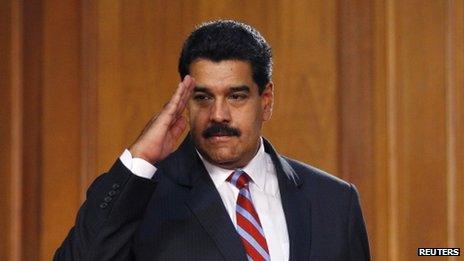
Dissatisfaction with Mr Maduro has been on the rise
The stakes will be high for both the government and the opposition in Venezuela's municipal elections on Sunday.
According to David Smilde, a senior fellow at the Washington Office on Latin America, the results of the vote for mayors and town councillors will be a test of the government's popularity.
"This is the first election since April, when Nicolas Maduro just barely squeaked by," he says referring to April's presidential election when Mr Maduro won by an unexpectedly narrow margin of 1.5 percentage points.
The opposition, led by Henrique Capriles, contested the result, alleging there had been irregularities. But the National Electoral Council carried out a recount and declared the results valid.
Dividing forces
The country became more divided than ever in the wake of the vote.
Opposition supporters questioned the legitimacy of the new president, while Chavistas - as supporters of the late President Hugo Chavez are known - accused the opposition of trying to stage a coup.
The municipal elections could be an indication of how voters feel eight months on, but analysts think there is little chance of there being a clear winner.
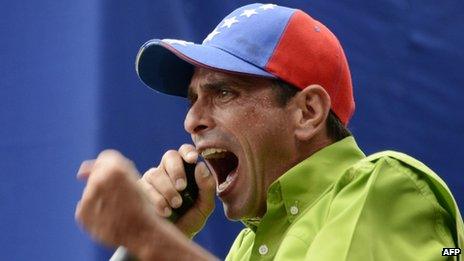
Mr Capriles has urged voters to show their discontent with the government
"Both sides may be able to declare victory on 9 December, depending on what you define as victory," says Eugenio Martinez, an election analyst working for the pro-opposition newspaper El Universal.
"There are 337 different elections on Sunday" he says referring to the number of mayoral posts up for grabs.
According to most polls, the government coalition looks likely to win in a majority of municipalities.
What is less clear is whether it will be able to take control of the country's two largest cities, Caracas and Maracaibo.
Bigger picture
But both the government and the opposition have argued in their campaigns that Sunday is about much more than choosing local representatives.
From the start, the opposition has portrayed the vote as a referendum on the performance of Mr Maduro, whom it blames for Venezuela's economic woes.
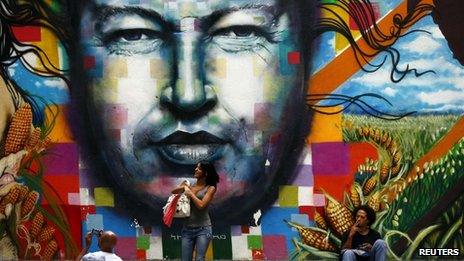
The government has declared 8 December "Day of Loyalty and Love towards Chavez"
The government, on the other hand, wants to be able to show it can count on the support of the voters at a difficult economic time.
Victory is therefore important to both camps, but the stakes seem higher for the opposition.
"The opposition trapped itself," says Julio Escalona, Venezuela's Deputy Ambassador to the United Nations.
"They told their voters that these are decisive elections. But they may not win, and that would become a serious political problem for them," he told BBC News in a telephone interview from New York City.
Mr Smilde also believes the opposition has been losing ground.
"Until the end of October, it looked like the opposition was in the driver's seat," he says.
'Special powers'
With an annual inflation rate of 54.3%, shortages of food staples and frequent power cuts, dissatisfaction with Mr Maduro had been on the rise.
"But then things changed," Mr Smilde explains.
In early November, the president ordered the seizure of a chain of electronics stores, accused them of overcharging, and forced them to slash their prices.
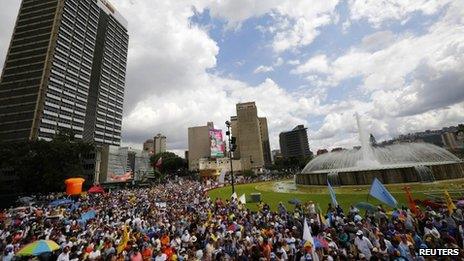
Opposition supporters have been denouncing high inflation and shortages
Later that month, the National Assembly granted Mr Maduro special decree powers that allow him to pass laws without the assembly's approval for 12 consecutive months.
Polls suggest that soon after, a large majority of Venezuelans started viewing the president's work as positive, leaving the opposition on shakier grounds.
A convincing victory for the government could spell the end of Mr Capriles as leader of the opposition coalition, according to Mr Smilde.
Another defeat could make it hard for him to hold together the coalition of 30 often divided parties.
'No fair play'
Ignacio Avalos, who heads the Venezuelan Electoral Observatory, a NGO which has often been critical of the government, says the opposition has been facing an added difficulty.
"The worry is that the campaign was very uneven, there was no fair play," he says.
Among other things, Mr Maduro declared 8 December as a day to commemorate the memory of the late president Hugo Chavez.
The government says it chose 8 December as the "Day of Loyalty and Love towards Chavez and the Motherland" because it is the first anniversary of Mr Chavez's famous speech, when he announced the re-occurrence of his cancer and asked voters to pick Mr Maduro as the new president if he were not to return from cancer treatment in Cuba.
In a statement, the Venezuelan Electoral Observatory said Venezuelans "are facing the risk that the commemorative acts and events may become acts aiming at recruiting votes for the candidates supported by the executive power".
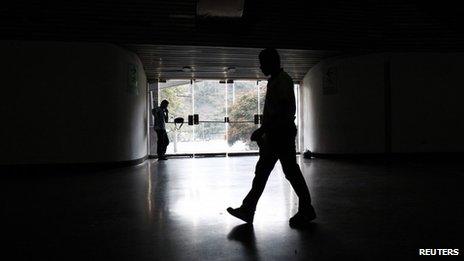
The government blamed the opposition for a recent power cut that hit many Venezuelan states
"The principles of equity and equality established in our legislation would thus be violated," the statement warns.
But analysts say that despite the recent polls suggesting increased approval of the president's performance, the government coalition may not fare much better in Sunday's election than in its razor-thin win in April.
Some critics say a poor performance could lead to internal divisions within Chavismo..
But Mr Escalona thinks a partial defeat will only spur the government on in its performance.
"If the government loses the main cities, it means that they will have to do a better job in the future," he assures.
"Chavez's legacy still has a vital importance within Chavismo.. I don't see any reason for a political fracture. There are many reasons to remain united," he says.
Election analyst Eugenio Martinez agrees that the onus on Sunday is on the opposition:
"No matter the result, [Nicolas] Maduro will remain the president. But the opposition needs this victory to show its strength," he says.